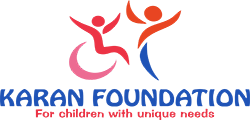Learning Activities
Classes are run regularly 4 hours a day, 5 days a week following the Montessori Method of education. We help children with special needs to complete their schooling from Grade 1-12 from NIOS (National Institute of Open Schooling) and NIOS-OBE (Open Basic Education). We provide them pre-vocational and life skill training. The idea is to encourage learning through fun so that the children do not feel burdened with the challenges they faced at an early age from the conventional, stressful methods of teaching and learning.
The various activities that the children do in the class could be broadly categorized under the following categories:
- Play
- Social Interaction
- Physical Development
- Language Development
- Emotional development
- Cognitive Development
Teacher Trainings
Teachers trainings are organized at regular intervals to help teachers learn about new ways to teach their courses to the children. Feedback from the teachers is taken after the trainings. Class activities are monitored to ensure that the new things taught are included in the curriculum.
The teacher’s trainings are focused on the following issues:
- Milestones and Developmental Stages of a Child
- Understanding a Child (Basic Child Psychology)
- Roles and Responsibilities of a teacher
- How to develop an effective curriculum and planning
- Different teaching methodologies
- Classroom Environment
- Parent Involvement
- Health, Hygiene and Nutrition
Nutrition Support
We strive to improve the nutritional food intake of children by making their parents aware of the importance of a balanced and nutritious diet.
Children are given nutritious snacks every day.
Parent – Teacher Meetings
We regularly organize meetings with parents where teachers share the progress of their child in the class, as well as the health status of the child. Our teachers keep a detailed record of each child to give to the parents. Feedback from parents is used to help improve the curriculum.
Linking Children to Formal Education
Parents and children are regularly counseled to emphasize the importance of education. Children are directed to a nearby education facility and enrolled in formal education system.
Monitoring and Evaluation
We hold monthly monitoring meetings with teachers to discuss strengths and weaknesses of a particular curriculum. By evaluating the previous month’s activities, the schedule for the upcoming month is created.
Impact assessment is done to ensure that the program is creating the required impact and reaching out to the community.
The following aspects are evaluated:
- Number of children in the class
- Attempt to link children in formal education
- Number of children back to school
- Change in children’s behavior and habits (like health, hygiene, interest towards education)
